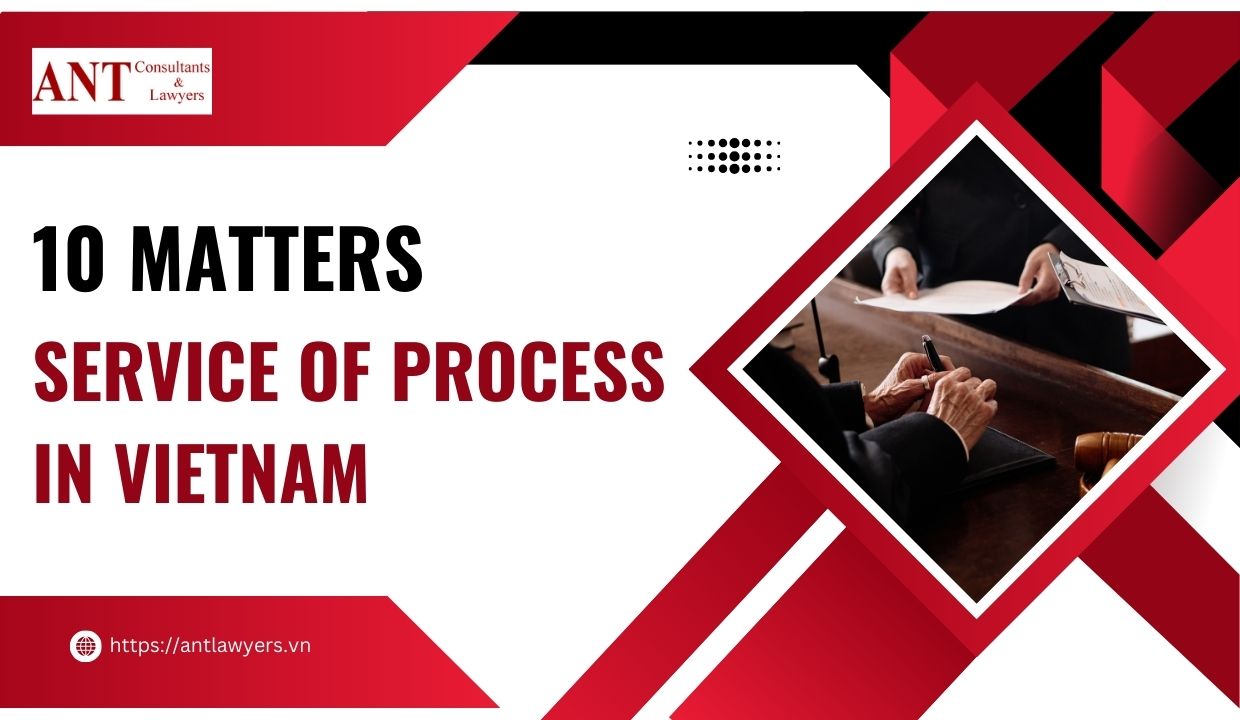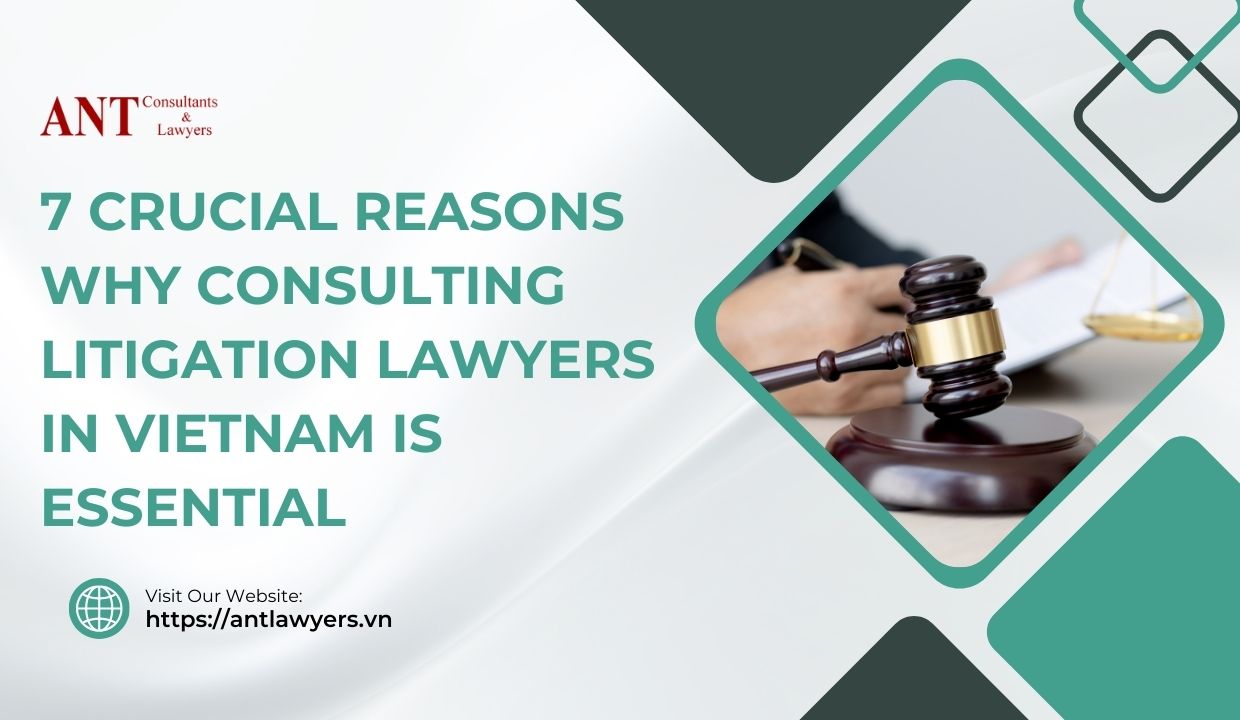For foreign companies and law firms handling disputes in Vietnam, understanding the service of process in Vietnam is critical for ensuring legal proceedings are valid and enforceable. Whether pursuing litigation against a Vietnamese company or serving legal documents to individuals residing in the country, proper service of process ensures compliance with local laws and protects the rights of all parties involved.
This guide provides a comprehensive overview of service of process in Vietnam, covering methods, challenges, legal requirements, and practical solutions for foreign lawyers and businesses.

What Is Service of Process in Vietnam?
Service of process refers to the legal procedure of delivering court documents to individuals or entities to notify them of ongoing legal proceedings. It ensures that a party has the opportunity to respond before a court makes any judgment against them.
In Vietnam, service of process is strictly regulated by the Civil Procedure Code and other relevant laws. Courts and authorized entities must follow specific legal procedures to serve documents properly. Failure to comply can result in case delays, dismissals, or unenforceable judgments.
Legal Framework Governing Service of Process in Vietnam
The key legal provisions regulating service of process in Vietnam include Civil Procedure Code which governs civil and commercial litigation procedures, including service of process rules.
Methods of Service of Process in Vietnam
Personal Service
This is the preferred and most reliable method of service of process in Vietnam. It involves physically delivering legal documents to the recipient. The delivery can be made by:
- The court’s judicial officers
- A bailiff office (in jurisdictions where bailiff services exist)
- An authorized individual (such as a legal representative)
The recipient is required to sign an acknowledgment of receipt to confirm service.
Substituted Service
If the recipient cannot be reached directly, substituted service may be applied. This includes:
- Delivering documents to an adult family member living at the recipient’s registered address.
- Delivering documents to the recipient’s employer or company representative.
The recipient is still legally considered served even if they refuse to accept the documents, as long as the server records the refusal.
Service by Post
Vietnam allows service of process through registered mail with confirmation of receipt. This method is commonly used when serving documents to corporate entities.
However, if the recipient refuses to receive the documents or does not sign the receipt, service by post may be considered unsuccessful, requiring alternative service methods.
Service by Publication
When the recipient’s whereabouts are unknown, courts may order service via public announcement in a legal newspaper. This method is used as a last resort when other service attempts have failed.
A notice is typically published three consecutive times in an official newspaper, and the recipient is deemed served within a set period after the final publication.
Service on Corporations and Businesses
For foreign companies suing Vietnamese businesses, service of process in Vietnam must be directed to the company’s legal representative or registered address.
- If a company refuses service, the documents may be delivered to the business registration authority or another regulatory body that oversees the company.
- For foreign-invested enterprises (FIEs), service may be conducted through the Department of Planning and Investment (DPI).
Challenges in Service of Process in Vietnam
Despite clear legal procedures, service of process in Vietnam can present several challenges for foreign companies and lawyers:
Evasion of Service
Some defendants, especially in commercial disputes, deliberately avoid being served. This can delay proceedings and complicate enforcement efforts.
Incorrect Address Information
Vietnamese individuals and companies often change addresses without updating official records, making service difficult.
Resistance to Judicial Authorities
Recipients may refuse to sign documents or acknowledge receipt. In such cases, court officers may record the refusal, but this can still lead to procedural delays.
Complex Corporate Structures
For multinational corporations or businesses with multiple subsidiaries, determining the correct entity for service of process in Vietnam can be complicated.
Solutions to Overcome Service Challenges
Foreign companies and law firms can improve the success of service of process in Vietnam by adopting these strategies:
Conduct Due Diligence Before Filing a Case
- Verify the recipient’s address using official business registries and local contacts.
- Use private investigators or local lawyers to confirm the defendant’s actual location.
Work with Local Process Servers and Law Firms
- Engaging a Vietnamese law firm with expertise in service of process in Vietnam ensures compliance with local legal requirements.
- Professional process servers can assist in navigating complex cases, especially when defendants attempt to evade service.
Utilize Bailiff Services
- In some regions, bailiffs provide an alternative to court officers for document service.
- Bailiff records hold legal weight and can be used as proof of service in court.
Request Court-Assisted Service
- If service attempts fail, courts in Vietnam can order enforcement measures to ensure successful service.
- Courts may also collaborate with administrative agencies to locate the recipient.
Consequences of Improper Service of Process in Vietnam
Failure to properly serve legal documents can have serious consequences, including:
- Case Dismissal – Courts may reject a case if service requirements are not met.
- Delayed Proceedings – Improper service can lead to lengthy delays, increasing legal costs.
- Difficulty in Enforcing Judgments – If a defendant claims they were not properly served, enforcement of a judgment can be contested.
Service of Process for Foreign Plaintiffs
Foreign companies and law firms litigating in Vietnam must follow additional procedures for valid service of process in Vietnam:
- Legal documents must be translated into Vietnamese and notarized before service.
- Foreign plaintiffs should appoint a local legal representative to facilitate service and communication with courts.
- If serving documents from abroad, check if the Ministry of Justice in Vietnam must approve and coordinate service or not.
Conclusion
Understanding the complexities of service of process in Vietnam is essential for foreign companies, law firms, and lawyers representing clients in disputes against Vietnamese individuals or businesses. Ensuring proper service safeguards the integrity of legal proceedings and enhances the chances of successful dispute resolution.
For foreign entities navigating Vietnam’s legal system, working with local experts can make the difference between an enforceable judgment and a procedural deadlock. By staying informed and following the correct legal steps, foreign litigants can protect their legal interests and achieve successful outcomes in Vietnam.
About ANT Lawyers, a Law Firm in Vietnam
We help clients overcome cultural barriers and achieve their strategic and financial outcomes, while ensuring the best interest rate protection, risk mitigation and regulatory compliance. ANT lawyers has lawyers in Ho Chi Minh city, Hanoi, and Danang, and will help customers in doing business in Vietnam.

